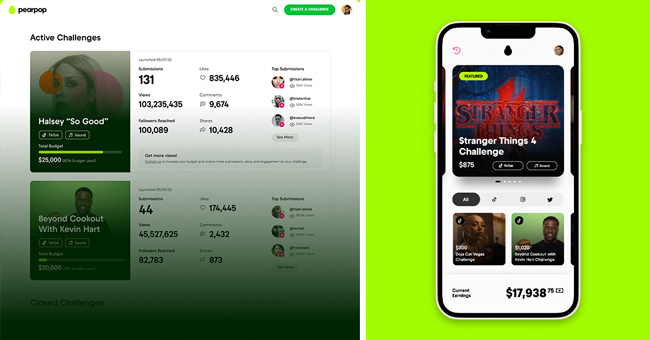
Long gone are the days when a celebrity or athlete spokesperson was the only tool for brands to tap into large, new consumer groups.
Pearpop – a marketplace platform connecting brands and content creators – dropped The Pearpop Energy Drink today on the belief that it can build a slate of new brands spanning numerous categories overnight, with products that don’t even exist.
“These are not intended to be, from the jump, real products that if you walk into a CVS you can buy tomorrow,” stated Alex Morrison, Pearpop CMO. “These are [fake] product creations, but what is real is the power of creator marketing to propel a brand into the public consciousness.”
The new energy drink “launched” on the TikTok, Instagram Twitch, and YouTube pages of only a handful of creators including video game streamer Eva Cudmore and TikTok comedian, Christian Barnes. For now, that is as far as the beverage’s distribution will reach, but Pearpop is using the faux-product as proof it can generate a significant footprint solely within the digital sphere.
“The whole idea here is that we’re going to see what the response is,” said Morrison. “What we’re most excited about is to showcase the power of creators to launch and create that initial groundswell around a new product and show we can create results for a brand that literally didn’t exist yesterday. If we can do that, it’s a pretty good indication that this is pretty powerful for any brand.”
The company also launched a range of other branded “pop-culture relevant” faux-products for the campaign, all created in collaboration with ad agency DDB Chicago, including a cosmetic company, pop-up fast food concept, bluetooth speaker and an original song.
As the creator economy has evolved, Morrison believes CPG food and beverage brands are perfectly positioned to unlock growth and sales through this approach. He sees a well balanced mix of micro and macro influencers who align with the brand’s image and ethos as an opportunity for beverage brands to cut into the stronghold some well-established players have on the market.
“There is no one sweet spot, or perfect follower count that every brand should be aspiring to,” said Morrison. “It’s not all about the micro, it’s not all about hundreds of millions of followers, or digitally native celebrities. It’s about finding creators who are the right authentic fit for your brands and really leaning into partnership and collaboration with those creators.”

The two-year-old startup assesses brand and creator’s identities as well as their follower makeup to then open up engagement opportunities like “Challenges” where participants can post specific content for a cash reward, determined by engagement milestones. In November, Pearpop raised $18 million to scale the platform.
While the new Pearpop brands will complete a URL and landing page, consumers looking to make a purchase won’t be greeted with a legitimate Shopify store or any actionable ‘add to cart’ options, but rather the simple headline: “Fake Products. Real Results.”
According to Morrison, Pearpop chose to release an energy drink because it believed the format naturally appeals to the young, social media savvy group it was hoping to capture in the campaign.
He also cited Prime Hydration, which was launched in January 2022 by Youtuber Logan Paul and KSI, as a chief example of a hyper-successful creator-brand launch strategy. After only a year on the market, Prime garnered $250 million in retail sales, became the sixth largest sports drink brand in the U.S., expanded its hydration platform into energy and powders and has begun toying with an international launch.
“Really what they did is a version of the creator marketing playbook,” said Morrison. “We see the opportunity for any new brand created in 2023 and beyond, to really embrace the idea of creator collaboration from conception.”
Morrison said the formulation of Pearpop’s liquid is not what makes it unique and in a category like energy, with fairly narrow space for differentiation based on the formula, what makes one brand succeed over another is packaging, brand story and a strong, loyal following. That’s exactly the thesis it aims to prove with today’s activation.
“Obviously, there are some amazing beverage products on the market with real functional benefits and attributes that succeed on their own merits,” he said. “[But] we’re not trying to be the most novel or differentiated, functional beverage in terms of what’s in the bottle. What we are exploring here is, if you isolate the variables, ‘what would happen if you focused on building a brand and a truly modern, creator first way?’”